THE PASSIONS By E. Mark Windle
One of the most popular and rarest 1960s girl group 45 discoveries with northern soul appeal is without a doubt The Passions for their “If You See My Baby” (Elvitrue & Satelite 177). What was known before this piece of detective work commenced was that Elvitrue was an independent record label out of 1108 (1-2) South 7th Street, Wilmington NC. Set up in 1959, it was owned by John Lewis Jones and possibly James Wheeler. It had a most sporadic recording history with around ten releases, with the label closing in 1976. The repertoire included pop, soul, gospel, country and funk. Elvitrue essentially seems to have been a vanity outlet, with its random artist discography and association with the Rite custom pressing plant in Ohio.
Whilst “If You See My Baby” is likely the most popular on the northern scene, The Passions also delivered “Hello College Boy” (Elvitrue A27916), another competent girl group sound. Both 45s are elusive, with “If You See My Baby” commanding a four figure value at the time of writing. A third release on Cylyn, “What Am I to Do” (CY-0002) preceded these recordings, and to date remains relatively unknown even on the rare soul scene. Other groups with the same name which appeared on other labels during the same decade are unrelated.
Early attempts by the author to track down the members of The Passions and individuals associated with their recordings were thwarted by the red herring of the North Carolina location of Elvitrue. Credits on “Hello College Boy” had listed E. J. Chaplin from “Camp Lejeune, NC” as the songwriter. Camp Lejeune US marine base, Jacksonville was built in 1942, occupying approximately 14 miles of North Carolina coastline near Wilmington; tying in with the Elvitrue label address. The girls singing on this danceable mid sixties black girl group sound, leaning toward soul rather than pop, were clearly young teenagers at the time. This raised the possibility of them being students at Camp Lejeune High School, perhaps as children of military personnel. Available knowledge indicated that the girls’ names included Pat Lawless, Connie Bailey and Carol Paul. However, high school files and yearbooks failed to identify them as past students.
A similar check was made on E.J. Chaplin. The school archivist had no recollection of this individual, either as a student or teacher. Even the 2nd Marine division of the US Marine Corps were contacted in the knowledge that this outfit was the band division at Camp Lejeune at the time, and therefore the songwriter may have had some connection, as a marine. No easily accessible archive existed. One other song was known to be written in 1969 (likely two years after “Hello College Boy”) by an E.J. Chaplin for Cowtown, a Texas country label, which indirectly steered the investigation in another geographical direction.
As it turned out, The Passions had a lot more to do with Louisiana than the eastern seaboard. A further on-line search eventually located Carol Dean Paul (now Vaughan) via her daughter Denitrea Vaughan; and Constance “Connie” Bailey, now residing in Texas. Carol and Connie confirmed the group were from the Baton Rogue area of south west Louisiana and were school friends.
“The Passions were formed in 1967 after performing at a talent show at Baton Rouge High. We were about fifteen years of age. The original members were Dianne Williams (now Hamilton), Pat Lawless and me. I knew Carol, who joined the group later, from Jr. High” reveals Connie Bailey. “Musical influences included Gladys Knight and the Pips, and The Supremes. We sang at local events like the Miss Baton Rouge Pageant and social club functions and even appeared on Baton Rouge’s version of Bandstand. Ronnie Shaab was our initial manager. He owned a record store in downtown Baton Rouge.” Ron would arrange various live gigs for The Passions, including an appearance as the main guest attraction at the Blue Revue, a local talent show held at the Lincoln Theatre.
Ron Shaab would later made his mark in the late sixties and seventies as producer and songwriter for Stone Records and some collectable funk recordings. Before all this however, he brought The Passions to record a session in Montelbano brothers’ studio in downtown Baton Rouge.
The result was “What Am I to Do” featuring Dianne on lead vocal, backed with “Time is a Natural” with Connie on lead for the flip. This 45 has only really surfaced in recent years, and until now rare soul collectors did not necessarily link it with the ‘Elvitrue’ Passions. “What Am I to Do” is a superb example of female mid sixties, mid-tempo / beat ballad and still remains virtually unknown by most soul collectors in the UK, US and Europe. Pressing run numbers are unknown. Connie remembers hearing it on the radio but not any sales, although both DJ copies and issues are known to exist.
The Cylyn label was formed by Cyril Vetter, drummer, and Lynn Ourso, guitarist, with the support of studio owner Sam Montel in 1963, initially to put out to release what was effectively the result of a jam session by the Montel studio band - the inaugural label release “Warm Daddy’s Choice”. Throughout the sixties Vetter and Ourso continued to work both for their respective bands, the Greek Fountains and John Fred and the Playboys, as well as session for other artists at the Montel studio along the Mississippi River front in Baton Rouge. Vetter was probably best known for co-writing “Double Shot of My Baby's Love”, a later hit for The Swinging Medallions. Cyril Vetter and his band, or some combination of his and Lynn’s band, backed the girls on The Passions’ Cylyn release at the studio. Andrew Bernard, baritone sax with John Fred and the Playboys, arranged and played on both sides.
“The studio (later known as Deep South Recording) was owned by the Montelbano brothers. It was located in a portion of a produce warehouse in a building at the foot of the Mississippi River levee in Baton Rouge” remembers Cyril. “Sam Montel was the music entrepreneur. Micky was the more serious older brother who ran the produce business called the Fruit Exchange. There were always fruit trucks around and produce on the loading docks. Being that near the levee the studio always felt a little damp with the river so close and the low temp required to preserve the fruits and vegetables. A train track ran just behind the building so there was always a train whistle and rumble and a ship or tug fog horn adding to the kind of mystical feeling of the place. It wasn't a hit factory but it was a fun place to record especially at night when the fog rolled in and the smell of the river was very pronounced! I produced “What Am I to Do” on The Passions and wrote the flip "Time is a Natural" with my dear friend Don Smith. We also wrote "Double Shot of My Baby's Love" together, something of a beach music evergreen. Unfortunately, Don Smith was later killed in a small plane crash. He was a civil engineer by day and he died on the way to a job in the oil patch. But as to Cylyn itself, Lynn Ourso and I started that label to release the recordings we produced at the Montel studio. I was writing and producing at every opportunity. I loved being in the studio and could work non-stop as a 20-something! I eventually got drafted during the Vietnam War. When I got out of the army I went to Law School then ended up in the broadcasting business. I did a little music from my broadcasting company's offices and released four LP's on my label called The Record Company of the South. John Fred of John Fred and the Playboys was the label's general manager.”
After the Cylyn recording, the girls changed manager. Dianne dropped out of the group, eventually to be married. “Hello College Boy” was released on Elvitrue in 1967 or early 1968, and featured at least Connie and Pat on vocals. Denitrea Vaughan reported that whilst her mother Carol was not present on the “Hello College Boy” recording, she did appear on “If You See My Baby”. The session for “If You See My Baby” took place at a studio in Lafayette (a 45 minute drive from Baton Rouge), owned by the Rachou family. La Louisianne Recording Studio, located at 2823 Johnstone Street, Lafayette, is currently run by David Rachou. In the mid 1950s his father Carol Rachou had originally created a studio at the back of his stereo and record store, initially as a hobby. When his parents sold up their nearby grocery business, Carol moved premises and converted their store into what is now known as the La Louisianne Studio. Initially starting out with a single Telefunken microphone and an Ampex one track recorder, he built a small empire largely on Cajun, swamp pop and Zydeco recordings. A number of R&B tracks were also laid down here in the 1960s for the studio’s own label, La Louisianne Records - most notably for rare soul collectors, the Camille ‘Lil’ Bob (a.k.a. Little Bob and the Lollipops) 45s and LP releases. Rachou also provided a service for third party recordings; including the Elvitrue releases. In the 1980s Carol handed the business over to his son, and the studio continues to run to this day.
UK based rare soul collector Andy Rix had successfully made contact with James Easterling, co-writer of The Passions’ second Elvitrue 45 “If You See My Baby”, along with Lawrence Rodriquez (a.k.a. Buck Rogers). Jim and Buck were essentially country songwriters, who had links with the Jack Clement and Bill Hall publishing company. Clement was one of the major country figures throughout the 1960s who had a number of highly successful country songs recorded by national artists such as Johnny Cash, Ray Charles, Carl Perkins, Elvis Presley, Jim Reeves and Jerry Lee Lewis. However Easterling and Rodriquez worked on this song very much with an R&B flavour, belying their country roots.
An individual by the name of Melvin Dodge was the contact between the writers and the Elvitrue label for “If You See My Baby”. Obituary data and an archived 1963 Blues Appreciation Society newsletter suggests that Dodge was originally from Natchez, Adams County, Mississippi. By the early 1960s he started getting interested in the record business. At least one record on Global (a Natchez label) was released: Sonny Hodges “Flame”, a slow teen Elvis attempt, in 1961. The family then appear to have moved to Ferriday, Louisiana; at least this is the location of two further labels set up by Dodge. An early sounding and uncharacteristic novelty instrumental by Texan blues piano player and songwriter Big Walter Price and his Thunderbirds was released in 1961 on Myrl (the name of Melvin’s wife). The Sonny Hodges 45 was released again, on Myrl. ‘Dodge’ was a second label which carried another instrumental, this time an early R&B instrumental called “Shimmy Shimmy Walk” by The Megatons. This was released the same year.
Jim Easterling relayed the story to Andy Rix where Dodge simply decided he wanted to make a record, so he went to Nashville and was given “Shimmy Shimmy Walk”. The Megatons featured at least some of Bill Black’s band and they recorded the track at Pepper Tanner studio in Memphis, 1961. Dodge took the song to Louisiana to press the record, and then to Hollywood to find a DJ to promote it. That record went to the top ten national charts. Leonard Chess in Chicago called Dodge to buy the master. Dodge sold it to him for $10,000 (the record appearing on Checker the following year). Ultimately this record became a signature tune for a number of radio jocks throughout the US. Dodge went on to make some more records in Houston, Texas.
In 1968 Melvin Dodge asked Jim and the other writers / session players to go to the Lafayette studio to work with The Passions on “If You See My Baby”. Jim remembered Pat Lawless as being the lead singer and she is credited first on the label, though Connie Bailey reported she was lead, also confirmed by Carol. Jim didn’t see the group again after recording the tracks. The writers, session musicians and the girls never met the Elvitrue label owners. Melvin Dodge was the sole contact. Connie confirms that they signed with Dodge for the session but that was about their involvement with him other than the provision of transportation to and from the recordings.
“Both Elvitrue records were considered demos” says Connie. “Only about 25 to 50 were pressed. None were ever sold. We were played on the local radio station but our greatest reward came from the excitement of it all. We signed some kind of contract; our parents were sued by Elvitrue when we didn't pay for the demos. They ignored it and nothing ever came of it. That was it. I went to college after high school and Pat moved to out to New Orleans.”
No further recordings other than those which appeared on the Cylyn and Elvitrue / Elvitrue & Satelite 45s were made by the girls, and no unissued recordings exist. Why the tracks were pressed on a North Carolina label, remains a mystery. Some connection with Melvin Dodge, and label president John Lewis Jones perhaps, but the secret has probably been buried with Dodge.
“After The Passions, I sang with Johnnie Jackson and the Blazers, until I graduated from Southern University in 1972” says Connie. Johnnie Jackson and the Blazers are best known on the rare soul scene for their driving R&B number “What You Gonna Do” (J-Mer 101) featuring Merle Spears. Connie later remained involved in church and community choirs, and worked in Government as a business analyst until her retirement in 2010.
Carol Paul completed her Bachelor of Arts & Science at Southern University of Louisiana in Baton Rouge where she majored in music. She sang in the choir at Southern. After a move to Los Angeles, she became an accountant then opened a successful day care business, eventually moving to Dallas. Sadly, Carol Paul, Pat Lawless and Buck Rogers passed away during the preparation of this chapter. Carol’s daughter Denitrea remembers: “Throughout the majority of my life my mother always sang in the church choir. She was a soloist in the church. We did a mother/daughter concert together at our small Baptist church and sang in a community choir. I don't believe she was in any other groups but she always talked about her time with The Passions with such pride. "We were like the Supremes" she would say.”
This and fifteen other southern soul biographies appear in "RHYTHM MESSAGE", a new book by E. Mark Windle. Available at Blurb.co.uk or Blurb.com. Order details from http://www.blurb.co.uk/b/5936116-rhythm-message
Resources, notes and references
Andy Rix (including communications with Jim Easterling). Personal coms. October 2013.
Constance Bailey. Personal coms. November, December 2013; January 2014.
Dianne Williams (via Connie Bailey). Personal coms. November 2013.
Dr. Denitrea Vaughan (contact for Carol Vaughan). Personal coms. October 2013 to March 2014.
Cyril E. Vetter. Personal coms. December 2013.
Nick Cobban. Personal coms. October 2013.
Blues Unlimited (fanzine, 1963) Available at http://www.wirz.de/music/mags/grafik/bu0014.pdf
Martha Harville Information Specialist, National Honor Society Adviser, Lejeune High School, Camp Lejeune, North Carolina. Personal coms. October 2013.
SSgt. Christopher M. Dwyer, United States 2nd Marine Division, United States Marine Corps, Camp Lejeune, North Carolina. Personal coms. October 2013.
AS-PMA (Cowtown) discography. Available at http://www.songpoemmusic.com/labels/cowtown.htm
Nick Cobban. The Vinyl Word (blog). Available at http://thevinylword.blogspot.co.uk/2010_05_01_archive.html
Website: http://www.natchezdemocrat.com/2010/03/04/henry-dodge/
Website: http://www.findagrave.com/cgi-bin/fg.cgi?page=gr&GRid=83114986
Website: http://en.wikipedia.org/wiki/Jack_Clement
Website: http://www.besonic.com/News/g0r0l0t3o0i1500s1/article.html
La Louisianne Recording Studios. Available at http://www.lalouisiannerecords.com/studio.htm
Label scans from the collections of E. Mark Windle and Andy Rix
Photograph of the Passions courtesy of Dr. Denitrea Vaughan





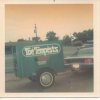
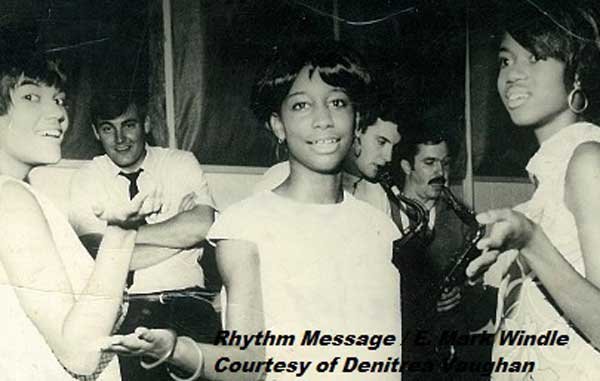
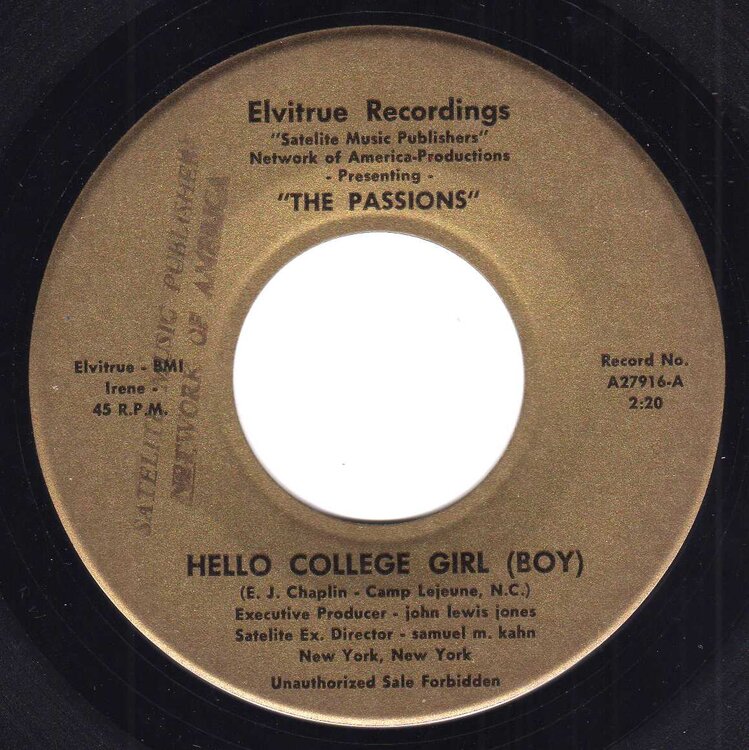
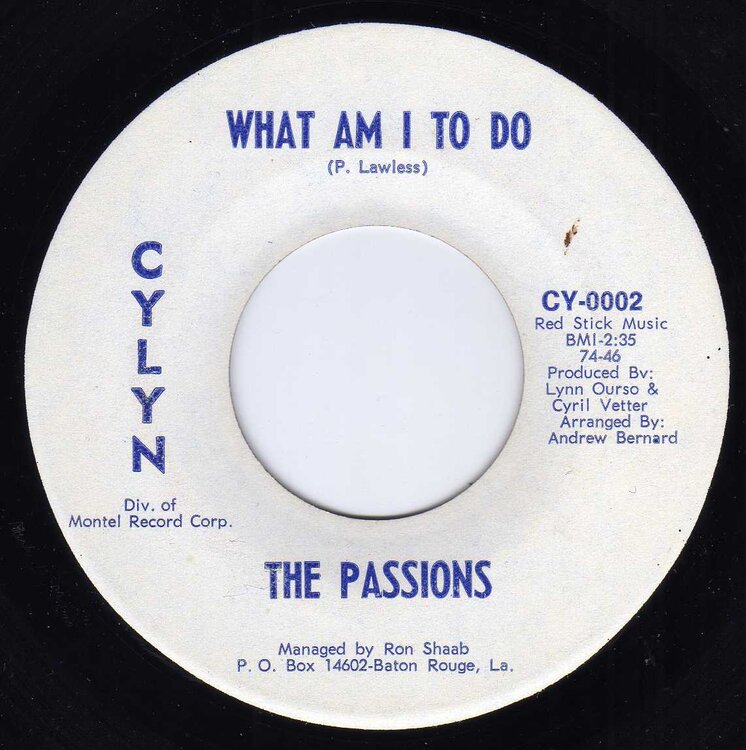
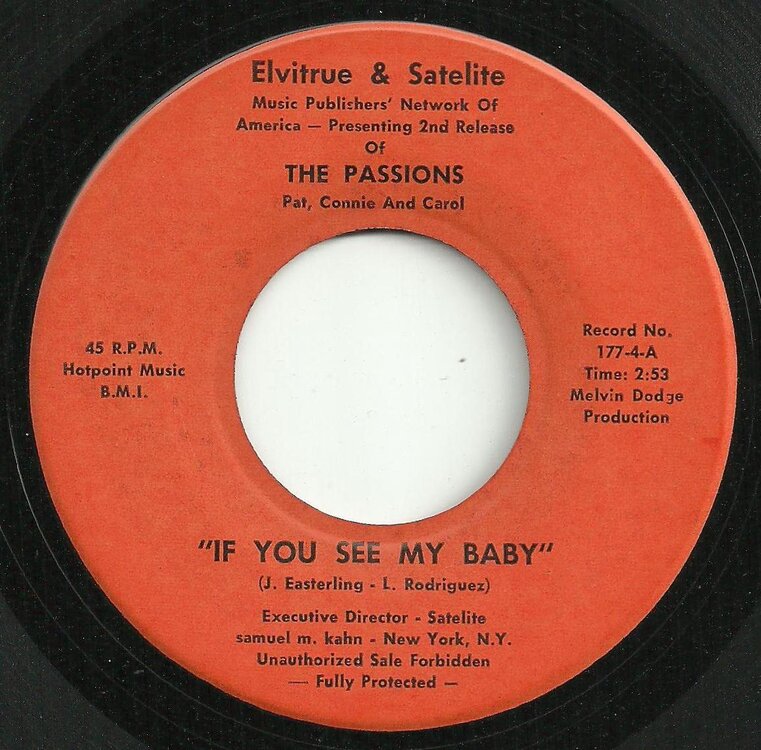

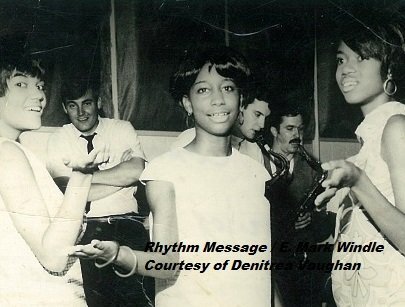

Recommended Comments
Get involved with Soul Source